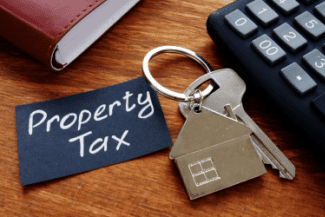How Are Property Taxes Calculated?
Key Takeaways
- Property taxes fund schools, fire departments, libraries and other municipal services.
- Your tax assessment is based on the estimated market value of your property.
- Property taxes are usually set at the state and local level.
- You can pay property taxes with your mortgage or as a separate direct payment.
What Exactly Are Property Taxes?

Local property taxes fund schools, fire departments, and libraries, and they can be a major source of funding for your city or county.
The Property Assessment
Your local tax assessor’s office determines your home’s value. Property assessments may be done every year or even just once every five years. It depends on state or local law. You should receive your value assessment first and then your property tax bill a little later.
The assessment is based on the tax assessor’s estimation of the market value of your property. Value is typically determined in one of three ways:
- Sales comparison: The assessor will compare your property to other similar properties that have sold in the immediate area in the recent past. They will then adjust for variables that may make your property more or less valuable than those that have sold. For instance, if you recently renovated your kitchen with high-end designer appliances that put other kitchens in the neighborhood to shame, that could increase the assessed value of your home.
- The cost method: The assessor calculates how much it would cost to reproduce your home from the ground up, including materials and labor. They will factor in depreciation if your property is older. They will also add the value of your land to the overall assessed value.
- The income method: This is used predominantly for commercial and business properties. The assessor estimates how much income you would expect to receive if the property were rented out based on factors such as costs of maintenance, insurance expenses, and prevailing rental rates.
Note
Some property tax bills show specific details on how much of your money goes toward which government and public expenses. Check with local authorities in your area to learn more about how your property tax dollars are spent.
Calculating Property Tax
Assessing the value of your property is the first step in the process. After that, your property’s assessed value is multiplied by the local tax rate. This rate is also sometimes called a “millage rate” or “mill rate.” One mill equals one-tenth of one cent, or $1 for every $1,000 of a property’s value.
Different governments can charge their own millage rates. Rarely is anyone’s property tax based on just one mill. For example, the average mill rate in Georgia is about 30 mills. That means the average property owner in Georgia pays roughly $30 in property taxes per every $1,000 of their property’s value every year.
Note
Communities often determine how much tax revenue they will require in a given period, then set a mill rate commensurate with raising that amount of money through property taxation.
Property taxes are generally set at the state and local levels, which means you may pay higher or lower property tax rates than another home down the road, across county lines.
An Example
Suppose you own property that was recently assessed to be worth $250,000. Your local millage rate is 45. Multiply the property’s value by 4.5% to arrive at your tax bill: $11,250. This is an annual rate, so—assuming that tax rates remain consistent—you will pay $11,250 every year. If your millage rate were dropped to 15, your tax bill would also decrease: You would only have to pay $3,750 in property taxes every year.
How Property Taxes Are Paid
You have options for how to pay your property taxes, though the specific options available to you will be decided at the local level. You may choose to pay property taxes as part of your monthly mortgage payment, or you may instead pay them in annual or semi-annual installments made directly to your local tax authority.
Frequently Asked Questions (FAQs)
How often are homes assessed for taxes?
The frequency of your home’s tax assessments depends on your location. States and counties are able to make rules around tax assessments, and the frequency can vary. For example, in Iowa property is assessed every other year. Meanwhile, in Tennessee, property is assessed on varying cycles that can run as long as six years.
How do you find out how much your property taxes are?
You should receive a property tax bill or notice each year from your local tax assessor. You can also calculate your property taxes by multiplying your home’s assessed value (not the market value) by the percentage of taxes levied in your area.
Source: The Balance Money















 Accessibility
Accessibility